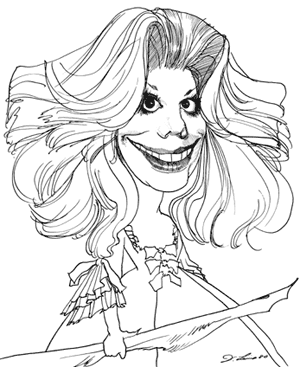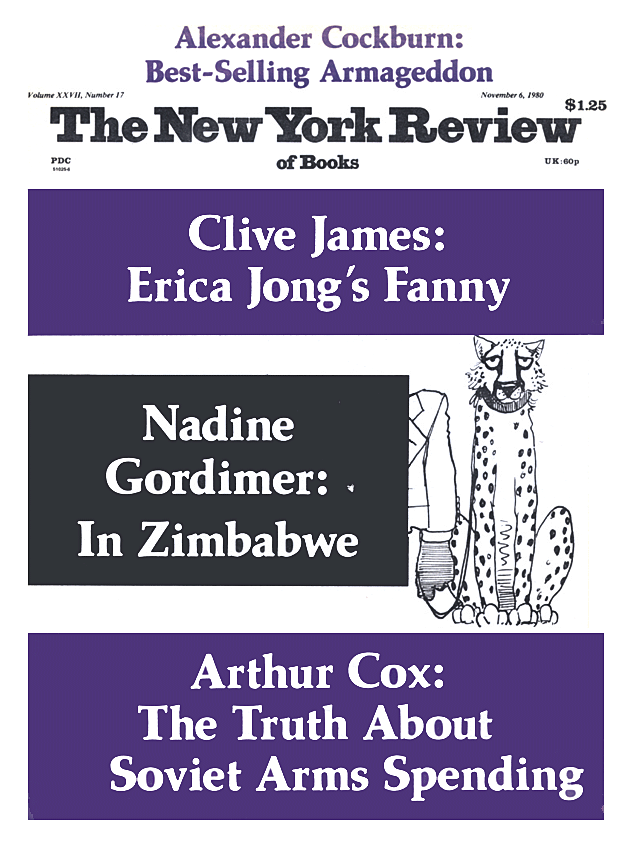Not long ago there was a popular novelist called Jeffrey Farnol, who is now entirely forgotten—which, when you think about it, is as long ago as you can get. Farnol wrote period novels in a narrative style full of e’ens, dosts, ’tises, and ’twases. Men wearing slashed doublets said things like “Gadzooks!” in order to indicate that the action was taking place in days of yore. Farnol was manifestly shaky on the subject of when yore actually was, but he had a certain naive energy and his books were too short to bore you. His masterpiece The Jade of Destiny, starring a lethal swordsman called Dinwiddie, can still be consumed in a single evening by anyone who has nothing better to do.
Erica Jong knows a lot more than Farnol ever did about our literary heritage and its social background. Her new book, which purports to be the true story, told in the first person, of the girl John Cleland made famous as Fanny Hill, draws on an extensive knowledge of eighteenth-century England. This is definitely meant to be a high-class caper. Nevertheless Jeffrey Farnol would recognize a fellow practitioner. There is something Gadzooks about the whole enterprise. On top of that it is intolerably long. Where Farnol’s Dinwiddie, after skewering the heavies, would have made his bow and split, Jong’s Fanny hangs around for hours.
Jong’s Fanny, it turns out, would have been a writer if circumstances had not dictated otherwise. Circumstances are to be congratulated. Left to herself, Jong’s Fanny would have covered more paper than Ruskin. There is something self-generating about her style.
I wrote Tragedies in Verse and Noble Epicks, Romances in the French Style and Maxims modell’d upon La Rochefoucauld’s. I wrote Satyres and Sonnets, Odes and Pastorals, Eclogues and Epistles. But nothing satisfied my most exalted Standards (which had been bred upon the Classicks), and at length I committed all my Efforts to the Fire. I wrote and burnt and wrote and burnt! I would pen a Pastoral’ thro’out three sleepless Nights only to commit it to the Flames! And yet were my Words not wasted, for ev’ry budding Poet, I discover’d, must spend a thousand Words for ev’ry one he saves, and Words are hardly wasted if, thro’ one’s Profligacy with ’em, one learns true Wit and true Expression of it.
Five hundred pages of that add up to a lot of apostrophes, i’faith. But the fault lies not with the ’tises and ’twases. A historical novel can survive any amount of inept decoration if it has some architecture underneath. Take, for example, Merejkovsky’s The Romance of Leonardo da Vinci, in the learned but stylistically frolicsome translation by Bernard Guilbert Guerney.
“Nay, nay, God forfend,—whatever art thou saying, Lucrezia! Come out to meet her? Thou knowest not what a woman this is! Oh, Lord, ’tis a fearful thing to think of the possible outcome of all this! Why, she is pregnant!… But do thou hide me—hide me!…”
“Really, I know not where….”
“‘Tis all one, wherever thou wilt,—but with all speed!”
As transmitted to us by the industrious Guerney, Merejkovsky’s Leonardo is every bit as noisy as Jong’s Fanny. But The Romance of Leonardo da Vinci is a good novel in the ordinary sense and as a historical novel ranks among the greatest ever written. The characters and the action help you to penetrate history—they light up the past. Jong’s Fanny makes the past darker. By the end of the book you know less about the eighteenth century than you did when you started.
Jong deserves some credit for trying to bring back yesterday, but what she is really doing, inadvertently, is helping to make you feel even worse about today. She uses pornography to preach a feminist message. This is a peculiarly modern confusion of motives. At least Cleland had the grace to leave out the philosophizing, although it should be remembered that those few general remarks which he put in were more pertinent in every way than anything which his successor has to offer. Here is Cleland’s Fanny at a critical moment.
And now! now I felt to the heart of me! I felt the prodigious keen edge with which love, presiding over this act, points the pleasure: love! that may be styled the Attic salt of enjoyment; and indeed, without it, the joy, great as it is, is still a vulgar one, whether in a king or a beggar; for it is, undoubtedly, love alone that refines, ennobles and exalts it.
Admittedly Cleland’s prose has been somewhat neatened up for modern publication, but you can still see that even in its original state it must have been a less strained instrument than that wielded by Jong’s Fanny. Cleland has other points of superiority too. For one thing, his pornographic scenes are actually quite effective. Indeed they are too effective, since pornography exceeds requirements if it makes you want to know the girl. Cleland’s Fanny Hill might not strike women as a book written from the woman’s viewpoint, but it can easily strike men that way. The book’s concern is with women’s pleasure, not men’s. Cleland’s Fanny does a powerfully affecting job of evoking what a woman’s pleasure is like, or at any rate what a man who likes women would like to think a woman’s pleasure is like. She leaves a man sorry for not having met her.
Advertisement
For Jong’s Fanny, whose full name is Fanny Hackabout-Jones (“Fannikins to lovers besotted with her charms”), the same cannot be said. She is a bore from page one. Even in moments of alleged transport she has one eye on her literary prospects. You just know that she will one day write Fear of Flying. One of her early encounters is with Alexander Pope. Erica—Fanny, sorry—tries to interest Pope in her verses, but he is interested only in her breasts. Pope is but the first of several famous men who make themselves ridiculous by pursuing Jong’s Fanny. (Swift involves her in a threesome with a horse.) All they see, you see, is Fannikins’s cunnikin. Passion blinds them to her attainments as a philosopher.
And yet, clearly, ’twas not the Best of all Possible Worlds for Women—unless, as Mr. Pope had argu’d, there was a hidden Justice behind this Veil of seeming Injustice…. Fie on’t! ‘Twas not possible that God should approve such goings-on! A Pox on the Third Earl of Shaftesbury and his damnable Optimism!
Running away from home, Jong’s Fanny falls in with a coven of witches. The witches, you will not be surprised to learn, are prototype feminists. They are given names like Isobel and Joan in order to allay your suspicions that they are really called Germaine and Kate.
“Fanny, my Dear,” says Isobel, “let me tell you my Opinion concerning Witchcraft and then Joan can tell you hers. ‘Tis my Belief that in Ancient Times, in the Pagan Albion of Old, Women were not as they are now, subservient to Men in ev’ry Respect….”
“E’en the very word ‘Witch,’ ” Joan interrupted, “derives from our Ancestors’ Word ‘Wicca,’ meaning only ‘Wise Woman.’ ”
Isobel lookt cross. “Are you quite finish’d, Joan?” says she. “Will you hold your Tongue now and let me speak?”
An oppressive male chauvinist society makes sure that these pioneer women’s liberationists are appropriately raped and tortured, but meanwhile Jong’s Fanny has become installed in a London brothel, where she shows an unusual talent for the trade. Colly Cibber’s son ties her to the bed. (“Now I am truly trapp’d in my own Snares, my Arms and Legs spread wide upon the Bed so I can make no Resistance, my Ankles and Wrists chafing ‘gainst the Silver Cords.”) Then he enters her. (“…Theo’s Privy Member makes its Presence felt near my not quite unsullied Altar of Love.”) Then he does something I can’t quite figure out. (“He sinks upon me with all his Weight and wraps his bandy Legs ’round my own….”) How bandy can a man be?
Jong seems to take it for granted that a woman’s lust can be aroused against her will, if only her assailant presses the right buttons—a very male chauvinist assumption, one would have thought. Cleland’s Fanny was more discriminating. But then, Cleland’s Fanny knew her own feelings. Jong makes Cleland one of her Fanny’s literary lovers. Jong’s Cleland is interested in role swapping and has a propensity for climbing into drag. Thus Jong lays the ghost of Cleland’s commendable success in fleshing out a feminine character. She says that he had a feminine character. Perhaps so, but what he mainly had was imagination.
Jong’s Fanny is meant to be an edifying joke, but the joke is not funny and the edification is not instructive, although it is frequently revealing. Setting out to show up Cleland, Jong unintentionally declares herself his inferior. As to the pornography, Cleland knew when to stop: his Fanny always concedes, while describing the moment of ecstasy, that beyond a certain point words fail her. Words fail Jong’s Fanny at all times, but she never stops pouring them out. Finally the sheer disproportion of the enterprise is the hardest thing to forgive.
I quite liked Fear of Flying: there was the promise of humor in it, if not the actuality. But in this book, which sets out to be light, comic, and picaresque, everything is undone by an utter inability to compress, allude, or elide. Is Peter de Vries to be the last author in America of short serious books that make you laugh? Joseph Heller’s Good as Gold is at least twice as long as it should be. By the time you get down to Erica there seems to be no awareness at all of the mark to aim at. If Max Beerbohm couldn’t sustain Zuleika Dobson, how did Erica expect to keep Fanny going for triple the distance on a tenth the talent? I’faith, ’tis a Puzzle beyond my Comprehension.
Advertisement
This Issue
November 6, 1980



